117 books about Spanish & Portuguese and 7
start with I
117 books about Spanish & Portuguese and 7
117 books about Spanish & Portuguese
7 start with I start with I
7 start with I start with I
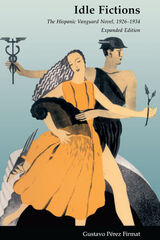
Idle Fictions
The Hispanic Vanguard Novel, 1926-1934, Expanded edition
Gustavo Pérez Firmat
Duke University Press, 1982
The "idle fictions" of the vanguard novel of the 1920s and 1930s in Spain and Spanish America represented a kind of interlude of playfulness--a vacation or parenthetical insertion--in what was perceived as the established course of the modern Hispanic novel's development. Yet, as Pérez Firmat argues, though this genre saw itself as recreative and interstitial, it deliberately precipitated "a class war not between social classes but between literary classes." Concentrating on source material not widely available, Pérez Firmat reconstructs the reception these novels received at the time of their publication, then develops a reading of them based on the intellectual context of this reception. A new preface and an appendix on vanguard biographies have been added to this paperback edition.
[more]
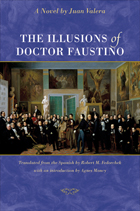
The Illusions of Doctor Faustino
Juan Valera
Catholic University of America Press, 2008
Translated from the Spanish by Robert M. Fedorchek with an introduction by Agnes Moncy
[more]
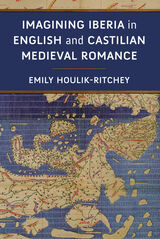
Imagining Iberia in English and Castilian Medieval Romance
Emily Houlik-Ritchey
University of Michigan Press, 2023
Imagining Iberia in English and Castilian Medieval Romance offers a broad disciplinary, linguistic, and national focus by analyzing the literary depiction of Iberia in two European vernaculars that have rarely been studied together. Emily Houlik-Ritchey employs an innovative comparative methodology that integrates the understudied Castilian literary tradition with English literature. Intentionally departing from the standard “influence and transmission” approach, Imagining Iberia challenges that standard discourse with modes drawn from Neighbor Theory to reveal and navigate the relationships among three selected medieval romance traditions. This welcome volume uncovers an overemphasis in prior scholarship on the relevance of “crusading” agendas in medieval romance, and highlights the shared investments of Christians and Muslims in Iberia’s political, creedal, cultural, and mercantile networks in the Mediterranean world.
[more]
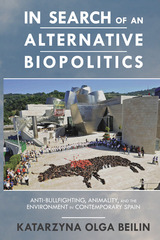
In Search of an Alternative Biopolitics
Anti-Bullfighting, Animality, and the Environment in Contemporary Spain
Katarzyna Beilin
The Ohio State University Press, 2015
In Search of an Alternative Biopolitics: Anti-Bullfighting, Animality, and the Environment in Contemporary Spain by Katarzyna Olga Beilin takes readers on a journey through the history of alternative thought that challenges mainstream understandings of the relations between the human and nonhuman realms. Weaving through the works of Mariano José de Larra, Eugenio Noel, Luis Buñuel, Luis Martín-Santos, Pedro Almodóvar, Pablo Bérguer, Juan Mayorga, and Rosa Montero, Beilin convincingly demonstrates that “the question of the animal” has long been of particular significance for Spanish culture.
Analyses of the synergy of press debates on bullfighting and the War on Terror, as well as media debates on King Juan Carlos’s hunt in Botswana and his resignation, reveal how the concepts structuring human/animal relations condition national biopolitics. Beilin traces a main principle, where sacrifice of some lives is deemed necessary for the sake of others, from bullfighting, through environmental destruction and immigration policies, to bioeconomy. Ultimately, In Search of an Alternative Biopolitics argues that to address ever-increasing threats of global warming and future catastrophes, we urgently need to redefine concepts structuring the human and the nonhuman realms.
Analyses of the synergy of press debates on bullfighting and the War on Terror, as well as media debates on King Juan Carlos’s hunt in Botswana and his resignation, reveal how the concepts structuring human/animal relations condition national biopolitics. Beilin traces a main principle, where sacrifice of some lives is deemed necessary for the sake of others, from bullfighting, through environmental destruction and immigration policies, to bioeconomy. Ultimately, In Search of an Alternative Biopolitics argues that to address ever-increasing threats of global warming and future catastrophes, we urgently need to redefine concepts structuring the human and the nonhuman realms.
[more]
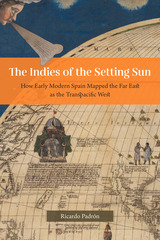
The Indies of the Setting Sun
How Early Modern Spain Mapped the Far East as the Transpacific West
Ricardo Padrón
University of Chicago Press, 2020
Padrón reveals the evolution of Spain’s imagining of the New World as a space in continuity with Asia.
Narratives of Europe’s westward expansion often tell of how the Americas came to be known as a distinct landmass, separate from Asia and uniquely positioned as new ground ripe for transatlantic colonialism. But this geographic vision of the Americas was not shared by all Europeans. While some imperialists imagined North and Central America as undiscovered land, the Spanish pushed to define the New World as part of a larger and eminently flexible geography that they called las Indias, and that by right, belonged to the Crown of Castile and León. Las Indias included all of the New World as well as East and Southeast Asia, although Spain’s understanding of the relationship between the two areas changed as the realities of the Pacific Rim came into sharper focus. At first, the Spanish insisted that North and Central America were an extension of the continent of Asia. Eventually, they came to understand East and Southeast Asia as a transpacific extension of their empire in America called las Indias del poniente, or the Indies of the Setting Sun.
The Indies of the Setting Sun charts the Spanish vision of a transpacific imperial expanse, beginning with Balboa’s discovery of the South Sea and ending almost a hundred years later with Spain’s final push for control of the Pacific. Padrón traces a series of attempts—both cartographic and discursive—to map the space from Mexico to Malacca, revealing the geopolitical imaginations at play in the quest for control of the New World and Asia.
Narratives of Europe’s westward expansion often tell of how the Americas came to be known as a distinct landmass, separate from Asia and uniquely positioned as new ground ripe for transatlantic colonialism. But this geographic vision of the Americas was not shared by all Europeans. While some imperialists imagined North and Central America as undiscovered land, the Spanish pushed to define the New World as part of a larger and eminently flexible geography that they called las Indias, and that by right, belonged to the Crown of Castile and León. Las Indias included all of the New World as well as East and Southeast Asia, although Spain’s understanding of the relationship between the two areas changed as the realities of the Pacific Rim came into sharper focus. At first, the Spanish insisted that North and Central America were an extension of the continent of Asia. Eventually, they came to understand East and Southeast Asia as a transpacific extension of their empire in America called las Indias del poniente, or the Indies of the Setting Sun.
The Indies of the Setting Sun charts the Spanish vision of a transpacific imperial expanse, beginning with Balboa’s discovery of the South Sea and ending almost a hundred years later with Spain’s final push for control of the Pacific. Padrón traces a series of attempts—both cartographic and discursive—to map the space from Mexico to Malacca, revealing the geopolitical imaginations at play in the quest for control of the New World and Asia.
[more]
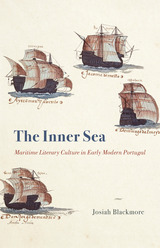
The Inner Sea
Maritime Literary Culture in Early Modern Portugal
Josiah Blackmore
University of Chicago Press, 2022
An expansive consideration of how nautical themes influenced literature in early modern Portugal.
In this book, Josiah Blackmore considers how the sea and seafaring shaped literary creativity in early modern Portugal during the most active, consequential decades of European overseas expansion. Blackmore understands “literary” in a broad sense, including a diverse archive spanning genres and disciplines—epic and lyric poetry, historical chronicles, nautical documents, ship logs, shipwreck narratives, geographic descriptions, and reference to texts of other seafaring powers and literatures of the period—centering on the great Luís de Camões, arguably the sea poet par excellence of early modern Europe.
Blackmore shows that the sea and nautical travel for Camões and his contemporaries were not merely historical realities; they were also principles of cultural creativity that connected to larger debates in the widening field of the maritime humanities. For Blackmore, the sea, ships, and nautical travel unfold into a variety of symbolic dimensions, and the oceans across the globe that were traversed in the fifteenth and sixteenth centuries correspond to vast reaches within the literary self. The sea and seafaring were not merely themes in textual culture but were also principles that created individual and collective subjects according to oceanic modes of perception. Blackmore concludes with a discussion of depth and sinking in shipwreck narratives as metaphoric and discursive dimensions of the maritime subject, foreshadowing empire’s decline.
In this book, Josiah Blackmore considers how the sea and seafaring shaped literary creativity in early modern Portugal during the most active, consequential decades of European overseas expansion. Blackmore understands “literary” in a broad sense, including a diverse archive spanning genres and disciplines—epic and lyric poetry, historical chronicles, nautical documents, ship logs, shipwreck narratives, geographic descriptions, and reference to texts of other seafaring powers and literatures of the period—centering on the great Luís de Camões, arguably the sea poet par excellence of early modern Europe.
Blackmore shows that the sea and nautical travel for Camões and his contemporaries were not merely historical realities; they were also principles of cultural creativity that connected to larger debates in the widening field of the maritime humanities. For Blackmore, the sea, ships, and nautical travel unfold into a variety of symbolic dimensions, and the oceans across the globe that were traversed in the fifteenth and sixteenth centuries correspond to vast reaches within the literary self. The sea and seafaring were not merely themes in textual culture but were also principles that created individual and collective subjects according to oceanic modes of perception. Blackmore concludes with a discussion of depth and sinking in shipwreck narratives as metaphoric and discursive dimensions of the maritime subject, foreshadowing empire’s decline.
[more]
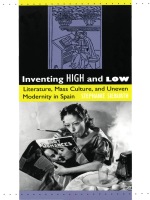
Inventing High and Low
Literature, Mass Culture, and Uneven Modernity in Spain
Stephanie Sieburth
Duke University Press, 1994
Dire word of the cultural threat of the lowbrow goes back at least to the ancient Greeks, and yet, Stephanie Sieburth suggests, no division between "high" and "low" culture will stand up to logical scrutiny. Why, then, does the opposition persist? In this book Sieburth questions the terms of this perennial debate and uncovers the deep cultural, economic, and psychological tensions that lead each generation to reinvent the distinction between high and low. She focuses on Spain, where this opposition plays a special role in notions of cultural development and where leading writers have often made the relation of literature to mass culture the theme of their novels.
Choosing two historical moments of sweeping material and cultural change in Spanish history, Sieburth reads two novels from the 1880s (by Benito Pérez Galdós) and two from the 1970s (by Juan Goytisolo and Carmen Martín Gaite) as fictional theories about the impact of modernity on culture and politics. Her analysis reveals that the high/low division in the cultural sphere reinforces other kinds of separations—between social classes or between men and women—dear to the elite but endangered by progress. This tension, she shows, is particularly evident in Spain, where modernization has been a contradictory and uneven process, rarely accompanied by political freedom, and where consumerism and mass culture coexist uneasily with older ways of life.
Weaving together a wide spectrum of diverse material, her work will be of interest to readers concerned with Spanish history and literature, literary theory, popular culture, and the relations between politics, economics, gender, and the novel.
Choosing two historical moments of sweeping material and cultural change in Spanish history, Sieburth reads two novels from the 1880s (by Benito Pérez Galdós) and two from the 1970s (by Juan Goytisolo and Carmen Martín Gaite) as fictional theories about the impact of modernity on culture and politics. Her analysis reveals that the high/low division in the cultural sphere reinforces other kinds of separations—between social classes or between men and women—dear to the elite but endangered by progress. This tension, she shows, is particularly evident in Spain, where modernization has been a contradictory and uneven process, rarely accompanied by political freedom, and where consumerism and mass culture coexist uneasily with older ways of life.
Weaving together a wide spectrum of diverse material, her work will be of interest to readers concerned with Spanish history and literature, literary theory, popular culture, and the relations between politics, economics, gender, and the novel.
[more]
READERS
Browse our collection.
PUBLISHERS
See BiblioVault's publisher services.
STUDENT SERVICES
Files for college accessibility offices.
UChicago Accessibility Resources
home | accessibility | search | about | contact us
BiblioVault ® 2001 - 2024
The University of Chicago Press









